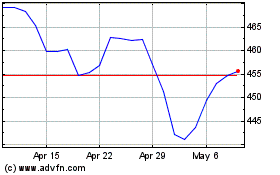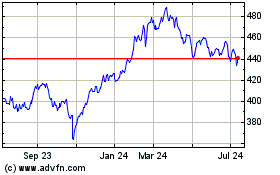By AnnaMaria Andriotis
Consumers have become addicted to credit cards with generous
rewards programs. Retailers are trying to cut them off.
Large merchants including Amazon.com Inc., Target Corp. and Home
Depot Inc. are pushing for the right to reject some rewards credit
cards, which typically carry higher fees for merchants. They are
likely to opt out of a roughly $6.2 billion settlement Visa Inc.,
Mastercard Inc. and several large banks recently reached with
merchants and continue to make their case in court, according to
people familiar with the matter.
The retailers are trying to end the card networks' "honor all
cards" rule, which requires merchants that accept Visa- or
Mastercard-branded credit cards to take all of them. If merchants
could pick and choose among Visa or Mastercard credit cards, those
with the highest merchant fees -- and most generous rewards --
likely would be on the chopping block.
The stakes are high all around. Rewards credit cards are wildly
popular among consumers for their perks like cash back, airfare and
hotel stays. Some 92% of all U.S. credit-card purchase volume is
currently charged on rewards credit cards, up from 86% in 2013 and
67% in 2008, according to estimates from Mercator Advisory Group
Inc., a payments research and consulting firm.
Yet merchants say rewards credit cards are cutting into their
profits. When shoppers pay with Visa or Mastercard credit cards,
merchants are charged interchange fees that are set by the card
networks and funneled to the banks that issued those cards. These
"swipe" fees are higher on rewards credit cards -- sometimes around
3% of the cardholder's purchase price.
Banks have come to rely heavily on the fees they earn from
credit cards. All told, merchants paid credit-card issuers $43.4
billion in Visa and Mastercard credit-card interchange fees in
2017, up 68% from 2012, according to the Nilson Report.
Rewards credit cards and a broader consumer shift to cards from
cash have fueled big gains for Visa and Mastercard in recent years.
Shares of Visa and Mastercard have soared 31% and 46%,
respectively, so far this year.
An upending of the fee structure could lessen the incentive for
small banks to issue credit cards, said Brian Riley, director of
credit advisory services at Mercator, cutting into the fees the
card companies collect and leaving them with a customer base more
heavily comprised of big banks that have more clout to negotiate
directly with merchants.
"The long-term risk to Mastercard and Visa still centers on
interchange more than anything else," said Mr. Riley. "In the next
three years, there's going to be a shakeout."
Card networks say preventing merchants from picking and choosing
among credit cards creates a frictionless experience for consumers.
They argue their rule also creates an even playing field by making
sure credit cards issued by banks large and small are accepted.
"If a merchant agrees to accept Mastercard, there cannot be any
discrimination between different issuers' cards or between
different types of cards issued by one financial institution," a
Mastercard spokesman said.
"Visa believes consumers should always have a choice in how they
pay, including being allowed to use their Visa credit card
regardless of the card type or issuer. When consumer choice is
limited, nobody wins," said a Visa spokeswoman.
The lead lawyer for a group of merchants suing Visa and
Mastercard to end the "honor all cards" rule said merchants aren't
trying to take away consumer choice. "What merchants want is the
right to negotiate the terms of acceptance like they do with
vendors in every other aspect of their business and partner with
banks directly," said Jeffrey Shinder, a managing partner at
Constantine Cannon LLP.
Retailers have been battling for years to lower interchange fees
and relax the rules governing credit-card agreements. A
class-action lawsuit filed in 2005 alleged that the policies are
anticompetitive.
While that lawsuit is closer to a resolution with the $6.2
billion settlement, Visa and Mastercard are likely to continue
battling with Amazon and other retailers that previously filed
separate lawsuits challenging the "honor all cards" rule.
A recent court ruling may bode well for the card companies. The
Supreme Court earlier this year ruled in favor of an American
Express Co. policy that prevents merchants that accept AmEx from
offering customers discounts and other incentives to pay with
cheaper credit cards.
Banks began rolling out more generous rewards credit cards about
six years ago in an effort to challenge AmEx, which dominated the
market for wealthy consumers. Citigroup Inc. ramped up the
rewards-card race in 2013 with its Prestige card. JPMorgan Chase
& Co. rolled out its Sapphire Reserve card three years later,
and U.S. Bancorp introduced the Altitude Reserve card in 2017.
The credit cards have annual fees of around $400 or higher,
large sign-up bonuses in exchange for sizable spending in the first
few months of usage, and travel benefits that range from airport
lounge access to travel expense reimbursement. Sapphire Reserve was
so popular, JPMorgan temporarily ran out of the metal used to
manufacture the cards.
As more cards were launched with higher swipe fees, they became
harder for retailers to avoid. For years, some merchants had opted
not to accept costlier AmEx cards, but rejecting Visa and
Mastercard could result in a steep decline in sales. (Unlike Visa
and Mastercard, AmEx both operates the card network and issues its
cards. An AmEx spokesman says that on average the current cost of
accepting AmEx is about the same as Visa and Mastercard.)
Visa and Mastercard premium credit cards charge some of the
highest interchange fees, often north of 2.1% of the purchase
amount, compared with roughly 1.2% to 1.7% on nonpremium credit
cards.
Interchange fees are often comprised of a flat fee plus a
percentage of the dollar amount of a cardholder's purchase. The
fees vary based on several factors, including merchant type and
fraud rates, and they aren't fixed. Large merchants try to
negotiate those fees. Amazon, for example, has been working to
negotiate lower interchange fees with Visa and Mastercard for years
on the grounds that it has lower fraud rates than many online
merchants, according to a person familiar with the matter.
For some merchants with lower margins, like grocers, the fees
can have a big impact. Kroger Co. unit Foods Co Supermarkets
stopped accepting Visa credit cards in August after the two
companies failed to reach an agreement on swipe fees.
Kroger Chief Information Officer Chris Hjelm said in an
interview at the time that the growing use of rewards credit cards
factored into the decision.
Write to AnnaMaria Andriotis at annamaria.andriotis@wsj.com
(END) Dow Jones Newswires
September 25, 2018 05:44 ET (09:44 GMT)
Copyright (c) 2018 Dow Jones & Company, Inc.
MasterCard (NYSE:MA)
Historical Stock Chart
From Aug 2024 to Sep 2024

MasterCard (NYSE:MA)
Historical Stock Chart
From Sep 2023 to Sep 2024
